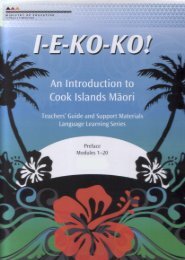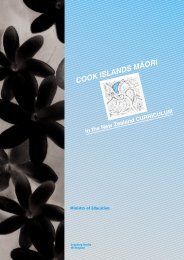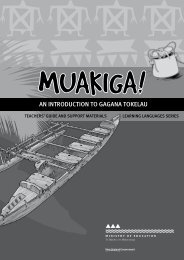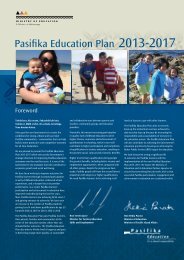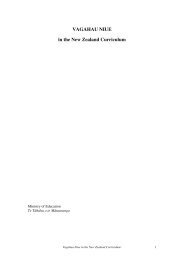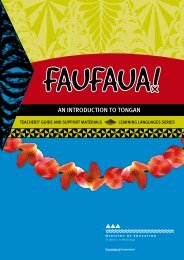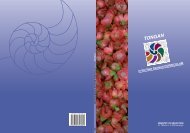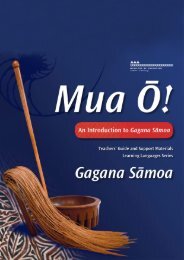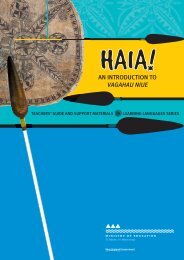Ta'iala mo le Gagana SÄmoa - Pasifika Education Community
Ta'iala mo le Gagana SÄmoa - Pasifika Education Community
Ta'iala mo le Gagana SÄmoa - Pasifika Education Community
You also want an ePaper? Increase the reach of your titles
YUMPU automatically turns print PDFs into web optimized ePapers that Google loves.
Atamai i <strong>le</strong> Aganu‘uCultural Know<strong>le</strong>dgeStudents will:‘O ni fa‘ata‘ita‘iga i <strong>le</strong> aganu‘u fa‘asā<strong>mo</strong>aSuggested aspects of fa‘asā<strong>mo</strong>aStudents could be <strong>le</strong>arning through experiences that allowthem to:76• participate appropriately in cultura<strong>le</strong>vents;• de<strong>mo</strong>nstrate understanding of statusin a variety of contexts;• understand ways in which culturesare organised for different purposes.• address other family members at a family gathering using ‘upufa‘aaloalo, for examp<strong>le</strong>, calling peop<strong>le</strong> to come and eat bysaying: E fa‘atulou atu ‘i <strong>le</strong> pa‘ia o <strong>le</strong> maota or Susū maia matala mai ‘a‘ao e fai <strong>le</strong> taumafataga, ‘ua māe‘a ona sāunia;• ask peop<strong>le</strong> to come inside to accept sua by saying: Susū maia etali <strong>le</strong> sua ‘ua māe‘a ‘ona teuteuina;• take appropriate actions during a family gathering, forexamp<strong>le</strong>, nofo ‘i lalo (sit down), fa‘atai vae (cross your <strong>le</strong>gs),<strong>le</strong>ote<strong>le</strong> (quiet voice), fa‘aaogā ‘upu fa‘aaloalo (use respectfulwords), nofo i <strong>le</strong> pito i tua (sit at the back);• address adults using lau susuga – susuga can be used whenyou are unsure of a person’s status or when addressingsomeone according to their professional status, for examp<strong>le</strong>,susuga i <strong>le</strong> faiā‘oga (teacher);• understand that the term lau afioga refers to the matai ali‘i,the matai who oversees the organisation of the family, and usephrases like Afio maia lau afioga Salā appropriately;• understand that the term lau tōfā refers to the matai tulāfa<strong>le</strong>,the one who speaks for the family, and use phrases like Maliumaia lau tōfā appropriately;• use the terms maota (for the home of a matai ali‘i) and laoa(for the home of a matai tulāfa<strong>le</strong>);• compare the ways in which visitors are welcomed in Sā<strong>mo</strong>a andin other languages and cultures.



